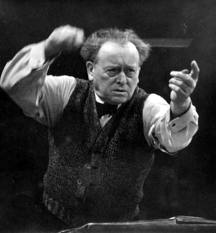If there is anything that can make you better at doing something, it is watching someone else do it inefficiently. Of course, prolonged observation of poor practice is no guarantee that you will actually get better at something yourself. It may just turn you into the worst of all creatures – the critic.
I, on the other hand, get to watch a lot of bad conductors, and this has made me an expert on almost everything.
I was talking with Jo-Michael Scheibe one day, and he said that his whole approach to conducting was simple. “What do you hear, and how are you going to fix it?” Like all true statements, it is at once both simple and profound. It’s also very difficult to do in real life. So here is the first of a series of rules to help you on the “fixing” side of the problem.
I learned this rule when I used to accompany for Robert Summer. It is very important. SAY ONE THING AND FIX IT. Bob used to say, if you say three things, people usually only remember the last one. Most people can’t even remember two things. Sometimes, tenors can’t even remember one thing. So, when you stop your ensemble, say one thing and fix it. After you fix it, you can say another thing and fix that.
Almost weekly, I see someone stop an ensemble or a student and then proceed with a laundry list of items that need to be fixed. Sometimes, the conductor just presents a list and doesn’t reasses to check if any of it is fixed. Sometimes the conductor does reassess, but becomes perplexed that not everything on the list is fixed. No matter what the level of the ensemble, I have still found Bob Summer’s simple rule is still always best practice. SAY ONE THING AND FIX IT.

Great food for thought as always, Kurt. I had a teacher that said habits were like grooves on a vinyl record (this was a long time ago) and the needle is your rehearsal. Every time a needle passes through the vinyl material, the friction actually makes the groove a little deeper with each subsequent pass (I don't know if any of this is true, but it was good imagery.) The moral of the story was that practice was beneficial ONLY if one was practicing something correctly; bad habits can also become habits and eventual the "groove" becomes so deep that it's virtually impossible to escape.
The reason I tell this story is that I've been a "say one thing" proponent, but it also has led me to rehearsals where we're seemingly stuck in one measure or one phrase for a while because there's always something that needs fixing (pitch, rhythm, bad vowel formation, sloppy technique, etc.)
I think it's hard finding the balance sometimes between not letting things accumulate into becoming bad habits, and not grinding the rehearsal into the pavement and squelching any sense of accomplishment or having any gestalt view. Maybe that's where the artistry of rehearsal technique comes in and recognizing the needs of the ensemble/student.
An excellent point, Dwight. That, indeed, is a tricky thing to balance. I find that the problems that many young conductors get into in this area is not from the rehearsal technique itself, but in picking appropriate repertoire for the skill level of the ensemble. Hmmm, I feel another blog post coming on.